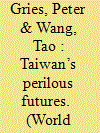|
|
|
Sort Order |
|
|
|
Items / Page
|
|
|
|
|
|
|
| Srl | Item |
| 1 |
ID:
143784


|
|
|
|
|
| Summary/Abstract |
2012–2013 witnessed a renewed flare-up of anti-Japanese sentiment in Mainland China, followed by a toughening of the People’s Republic of China’s (PRC) Diaoyu Islands policy. Did popular nationalism influence the PRC’s military escalation? A lack of transparency in elite Chinese decision-making puts a definitive answer to this question beyond our reach. However, this article utilizes qualitative and quantitative analyses of anti-Japanese discourse and deeds in both cyberspace and on the streets of urban China to argue that the circumstantial evidence is compelling: nationalist opinion is a powerful driver of China’s Japan policy. The demands of nationalist legitimation appear to pressure the elite to respond to popular nationalism. Should one or more Chinese die at the hands of the Japanese navy or air force, therefore, the popular pressure for escalation and war will likely be more than China’s leaders can manage.
|
|
|
|
|
|
|
|
|
|
|
|
|
|
|
|
| 2 |
ID:
096720


|
|
|
|
|
| Publication |
2010.
|
| Summary/Abstract |
China's growing demand for energy - and its dependence on coal - has seen its carbon emissions increase more than 50% since 2000. Within the debate about mitigating global climate change, there is mounting pressure for emerging economies like China to take more responsibility for reducing their carbon emissions within a post-2012 international climate change policy framework. For China, this leads to fundamental questions about how feasible it is for the country to shift away from its recent carbon intensive pattern of growth. This paper presents some general results of scenarios that have been developed to investigate how China might continue to develop within a cumulative carbon emissions budget. The results show how changes in the key sectors of the Chinese economy could enable China to follow four different low carbon development pathways, each of which complies with a cumulative emissions constraint. Each scenario reflects different priorities for governmental decision making, infrastructure investments and social preferences. Having compared the key features of each scenario, the paper concludes with some implications for Chinese government policy.
|
|
|
|
|
|
|
|
|
|
|
|
|
|
|
|
| 3 |
ID:
097513


|
|
|
|
|
| Publication |
2010.
|
| Summary/Abstract |
China's growing demand for energy - and its dependence on coal - has seen its carbon emissions increase more than 50% since 2000. Within the debate about mitigating global climate change, there is mounting pressure for emerging economies like China to take more responsibility for reducing their carbon emissions within a post-2012 international climate change policy framework. For China, this leads to fundamental questions about how feasible it is for the country to shift away from its recent carbon intensive pattern of growth. This paper presents some general results of scenarios that have been developed to investigate how China might continue to develop within a cumulative carbon emissions budget. The results show how changes in the key sectors of the Chinese economy could enable China to follow four different low carbon development pathways, each of which complies with a cumulative emissions constraint. Each scenario reflects different priorities for governmental decision making, infrastructure investments and social preferences. Having compared the key features of each scenario, the paper concludes with some implications for Chinese government policy.
|
|
|
|
|
|
|
|
|
|
|
|
|
|
|
|
| 4 |
ID:
174051


|
|
|
|
|
| Summary/Abstract |
The Taiwan Strait is heating up, as Mainland Chinese netizens, generals, and politicians increasingly talk about ‘forceful’ rather than ‘peaceful’ reunification. While Xi Jinping and Chinese nationalists desperately desire Taiwan’s reunification, Trump’s isolationist “America First” rhetoric has only encouraged reckless Chinese thinking about forcing reunification, and the Taiwanese remain largely passive, unable to confront an overwhelming threat. Wishful thinking in Beijing, Taipei, and Washington is increasing the odds of miscalculation. The 2020 presidential elections in Taiwan and the United States, and the ongoing U.S.-China trade war, furthermore, bode ill for peace in the Taiwan Strait.
|
|
|
|
|
|
|
|
|
|
|
|
|
|
|
|
|
|
|
|
|